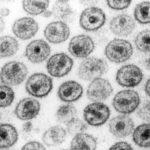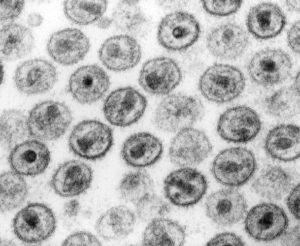One of the major challenges of developing a vaccine against HIV, is the extensive HIV strain diversity. One approach being tested to address this is the development of global mosaic HIV-1 Envelope (Env) and Gag-Pol immunogens that aim at expanding the breadth of immune responses to HIV-1 M group viruses. Barouch and colleagues aimed to evaluate the safety and immunogenicity of different combinations of the adenovirus serotype 26 (Ad26) or modified vaccinia ankara (MVA) vectors expressing HIV Env- and Gag Pol-mosaics (Mos.HIV) immunogens with or without high-dose or low-dose aluminium adjuvanted gp140 (clade C envelope protein) in a phase1/2b clinical trial. In addition to this, Barouch et al., also performed a similarly designed pre-clinical study in rhesus macaques, with the aim of directly comparing these results to those obtained in the clinical trial.
Barouch et al., observed that of the 7 vaccine regimens tested, the two dose Ad26-HIV mosaic prime followed by high dose gp140 vaccine was the most immunogenic in both humans and rhesus macaques. In humans, this vaccination regime resulted in induction of Env-specific antibody responses in all vaccinated individuals, with approximately 80% of individuals inducing T cell and antibody-dependent cellular phagocytosis responses. Using the pre-clinical model, researchers were able to show that similar vaccine-induced responses were observed in rhesus macaques and resulted in 67% protection against acquisition of Simian-HIV following repeated exposure. Using the immunogenicity data generated from the clinical trial, researchers were able to inform the vaccine regime that is currently being tested in a phase 2b efficacy trial in Southern Africa (Imbokodo (HPX2008/HVTN 705; NCT03060629)).
This large study represents one of the first studies, if not the first study that directly compares results from a pre-clinical study and clinical trial, where the same vaccine regiments and immunological assays were used.
Article: Barouch et al., 2018. Evaluation of a mosaic HIV-1 vaccine in a multicentre, randomised, double-blind, placebo-controlled, phase 1/2a clinical trial (APPROACH) and in rhesus monkeys (NHP 13-19). the Lancet
Article by Cheleka AM Mpande

